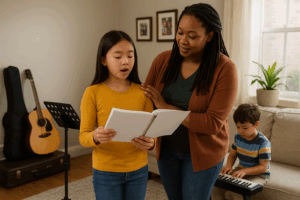Deciding when to start voice lessons for children can feel tricky. Age is just one factor; attitude, vocal maturity, and readiness matter more. Knowing when to begin lessons ensures the experience is beneficial, fun, and ultimately effective.
Key Readiness Indicators
- Clear pitch matching: Can your child mimic sung pitches by ear?
- Singing in tune: Does your child stay close to melody notes without excessive strain?
- Emotional engagement: Do they sing along willingly and joyfully—not just by habit?
Ultimately, readiness varies. Some children at ages 6–7 are ready for simple melody singing. Others benefit from waiting until age 9 or 10 to build control and endurance safely.
Recommended Progression
| Age or Stage | Musical Focus | Lesson Goals |
|---|---|---|
| 6–7 years old | Pitch matching, melody singing | Sing simple patterns with proper posture |
| 8–9 years old | Breath control, range awareness | Develop vocal stamina and healthy tone |
| 10 years and above | Repertoire with lyrics and phrasing | Perform full songs with expressive clarity |
If your child shows interest earlier, short sessions centered around singing familiar songs can be a gentle way to explore vocal learning without pressure.
How to Support Vocal Growth Early
- Encourage low-pressure singing: lullabies, simple songs, or family music time.
- Focus on healthy posture and breathing—elements even beginners should learn.
- Introduce games or echo exercises to build matching skills and listening focus.
These foundational practices support healthy vocal habits before technique is formally taught.
Why Proper Timing Matters
Beginning too early—or forcing singing—can lead to vocal strain or misplaced habits that are tricky to correct. Research shared by the Royal Conservatory of Music notes that encouraging vocal exploration without forcing range or power supports positive engagement and vocal health.
A thoughtful introduction—balanced with structure and warm encouragement—sets the stage for longer-term musical interest and vocal development.
Looking for musical building blocks beyond singing? Our article on how chord reading reinforces early musicianship is a helpful next step, even for young singers (and beginner pianists): reading chord charts guide.
FAQ – Starting Voice Lessons
Q: Is age 6 too early for formal voice lessons?
A: It depends. If your child enjoys gentle singing and can match pitch, informal voice sessions—or play-based music time—can be appropriate and fun.
Q: Should vocal range limit starting lessons?
A: Vocal range expands with time and supportive instruction. At early stages, we focus more on comfort and tone quality than hitting high notes.
Q: How long before singing “real songs”?
A: With consistent encouragement, many students begin singing complete simple songs within a few lessons focused on pitch and posture.
